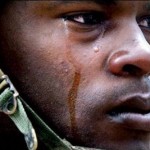From Shell Shock to Post-Traumatic Stress Disorder
 Post-traumatic stress disorder (PTSD) has a long history of being misunderstood and unappreciated. But now, perhaps more than in any other war, PTSD has become a prime affliction from the wars in Iraq and Afghanistan.
Post-traumatic stress disorder (PTSD) has a long history of being misunderstood and unappreciated. But now, perhaps more than in any other war, PTSD has become a prime affliction from the wars in Iraq and Afghanistan.
Perhaps more than any other war, post-traumatic stress disorder (PTSD) is a prime affliction from the wars in Iraq and Afghanistan, thanks primarily to tensions caused by the constant threat of roadside bombs and explosive devices.
Studies in the U.S. indicate up to 30% of those who serve are susceptible. One study of three U.S. army and one Marine unit showed up to 17% who served in Iraq suffered traits of PTSD, while 11% in Afghanistan did.
In the Canadian army, it is estimated that 13% to 20% of soldiers show signs of PTSD, depending on how many tours of Afghanistan they’ve undergone. In Canada, by the very nature of their trade, soldiers and police are especially susceptible to PTSD.
While very real, with both physical and emotional overtones, PTSD does not affect everyone who is exposed to war, violence, atrocities and tragedies. It strikes me it is worth studying why some individuals seem immune to the disorder, as well as studying those who are its victims.
It’s a complicated issue, made more so by a certain respectability, even popularity, that PTSD has acquired. The poster boy, so to speak, of PTSD is Lt.Gen. Romeo Dallaire whose emotional breakdown after commanding UN forces in Rwanda at the time of the genocidal massacres, is attributed to the horrors he witnessed.
That doesn’t begin to explain why some people are more prone than others to PTSD – which has a long history of being misunderstood and unappreciated.
In WWI, what would be called PTSD today was termed “shell shock,” and was vaguely embarrassing to those suffering from it, and often it was denied or disguised for fear it would be interpreted as “weakness.”
At the beginning of WWII, “shell shock” was defined as “lack of moral fibre” - a cruel indictment, utterly unfair and just plain wrong. By the end of the war, lack of moral fibre was changed to “battle fatigue,” which also had a certain respectability, and at least was recognition that some individuals crack, or break emotionally, more than others might.
Towards the end of the Pacific war, when it was clear the Japanese were beaten, an Australian commander in one of the islands was having trouble with a huge number of soldiers – maybe 25% - claiming “battle fatigue” rather than going on mopping up patrols.
The commandeer issued orders that henceforth “battle fatigue” would not go on medical records, but would be called “cowardice.” The percentage of claimants dropped instantly to 4%, -- and was recorded as battle fatigue, since the lead-swingers were now back on duty.
When WWII ended, it was fashionable to warn families at home, not to interrogate or ask returning veterans too many questions because of the trauma of remembering horrors they’d seen. Max Shulman wrote a humorous novel, Rally Round The Flag Boys, of a returning veteran who wanted to tell of his adventures but no one in his family would listen out of deference to his emotional health. This presumed lack of interest caused an emotional breakdown in the guy. Funny, but also pertinent.
While police and soldiers are the ones most prone to PTSD from what they are exposed to, training can alleviate much of the trauma such unpleasantries might cause. Usually that works, but on occasion, training films soldiers are subjected to have caused PTSD.
On the other hand, few consider what young nurses who work in, say, hospital emergency wards are exposed to, yet manage to do their job without breaking down. Maybe that’s because no one expects nurses to be anything but professional – so that’s what they are.
Again, none of this explains why some are more prone to PTSD than others. Has it something to do with individual empathy, sensitivity, too much imagination, propensity to brood or worry? Dunno.
I do know that no soldier dismisses PTSD, or thinks poorly of those afflicted, and those who aren’t susceptible thank their luck at being immune.